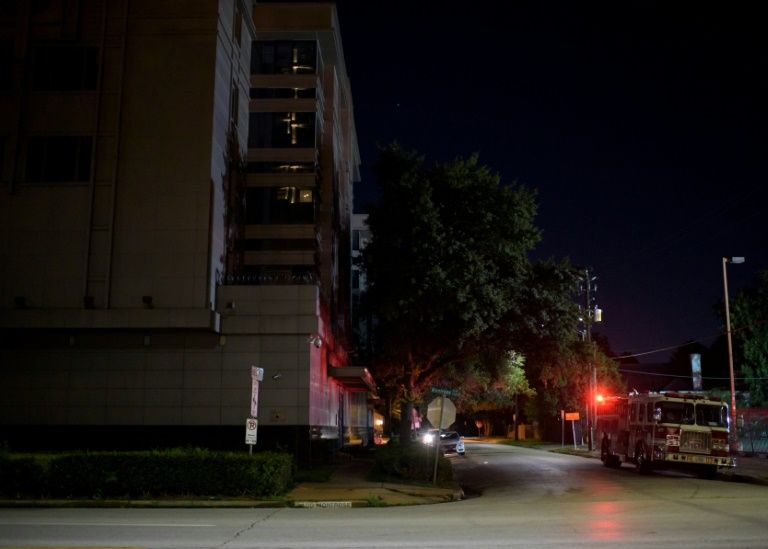US-Chinese tensions soar as consulate ordered to shut

US-Chinese tensions, already rising because of the coronavirus pandemic and crackdown in Hong Kong, ratcheted up another notch on Wednesday as the United States ordered the closure of the Chinese consulate in Houston within 72 hours.
China reacted angrily to the US move, which came a day after the unveiling of a US indictment of two Chinese nationals for allegedly hacking hundreds of companies worldwide.
“We’re setting our clear expectations for how the Chinese Communist Party is going to behave,” US Secretary of State Mike Pompeo said during a visit to Denmark.
“And when they don’t, we’re going to take actions that protect American people, protect our security, our national security, and also protect our economy and jobs,” Pompeo told reporters.
“President (Donald) Trump has said ‘enough,'” Pompeo said. “We’re not going to allow this to continue to happen.”
The secretary of state cited the indictment of the two Chinese nationals for computer hacking but did not specifically mention the order to close the Houston consulate.
That move marks a dramatic escalation in tensions between the superpowers feuding over a slew of issues ranging from trade to the pandemic to China’s policies in Hong Kong, Xinjiang and the South China Sea.
Republican Senator Marco Rubio said the Houston consulate was the “central node of the Communist Party’s vast network of spies & influence operations in the United States.”
“Now that building must close & the spies have 72 hours to leave or face arrest,” tweeted Rubio, acting chairman of the Senate Intelligence Committee.
State Department spokeswoman Morgan Ortagus said the consulate was ordered shut “in order to protect American intellectual property and Americans’ private information.”
Under the Vienna Convention, states “have a duty not to interfere in the internal affairs” of the receiving state, Ortagus said.
The State Department said China has engaged in massive spying and influence operations throughout the United States for years.
“These activities have increased markedly in scale and scope over the past few years,” it said.
– ‘Outrageous and unjustified’ –
In Beijing, Chinese Foreign Ministry spokesman Wang Wenbin said the order to close the consulate was an “outrageous and unjustified move which will sabotage China-US relations.”
“China urges the US to immediately withdraw its wrong decision, or China will definitely take a proper and necessary response,” Wang said.
“It is a political provocation unilaterally launched by the US side, which seriously violates international law… and the bilateral consular agreement between China and the US.”
Before the news emerged, firefighters and police were called Tuesday evening to the consulate building on reports that documents were being burned in trashcans in the courtyard, according to local media.
The Twitter feed of the Houston police force said smoke was observed, but officers “were not granted access to enter the building.”
The Chinese Consulate in Houston was opened in 1979 — the first in the year the United States and the People’s Republic of China established diplomatic relations, according to its website.
The office covers eight southern US states — including Texas and Florida — and has nearly one million people in the area registered there.
There are five Chinese consulates in the United States, as well as an embassy in Washington.
State-run tabloid the Global Times launched a poll on Twitter asking people to vote for which US consulate in China should be closed in response, including the ones in Hong Kong, Guangzhou and Chengdu.
The United States has an embassy in Beijing plus five consulates in mainland China and one in Hong Kong.
The US Justice Department on Tuesday unveiled the indictment of two Chinese nationals for hacking companies worldwide and also seeking to steal coronavirus vaccine research.
China rejected the allegations as “slander.”
The Chinese foreign ministry on Wednesday warned students in the United States to be “on guard” for “stepped up arbitrary interrogations, harassment, confiscation of personal belongings and detention.”
More than 300,000 Chinese study in the United States.
Trump’s administration has ramped up pressure on China on a wide range of issues, imposing sanctions over policies in Tibet and Xinjiang, where an estimated one million Uighurs and other ethnic groups are believed to have been held in re-education camps.
The United States has also downgraded relations with Hong Kong after China implemented a new security law which Washington says is in violation of Beijing’s promises of autonomy for the territory.
Last week, Washington formally declared Beijing’s pursuit of territory and resources in the South China Sea as illegal, explicitly backing the territorial claims of Southeast Asian countries against those of China.
Washington has also infuriated Beijing by banning telecom giant Huawei and seeking the extradition from Canada of top executive Meng Wanzhou.
SOURCE> AFP
PHOTO> A firetruck sits outside of the Chinese consulate in Houston after the US State Department ordered China to close the facility (AFP Photo/Mark Felix)










